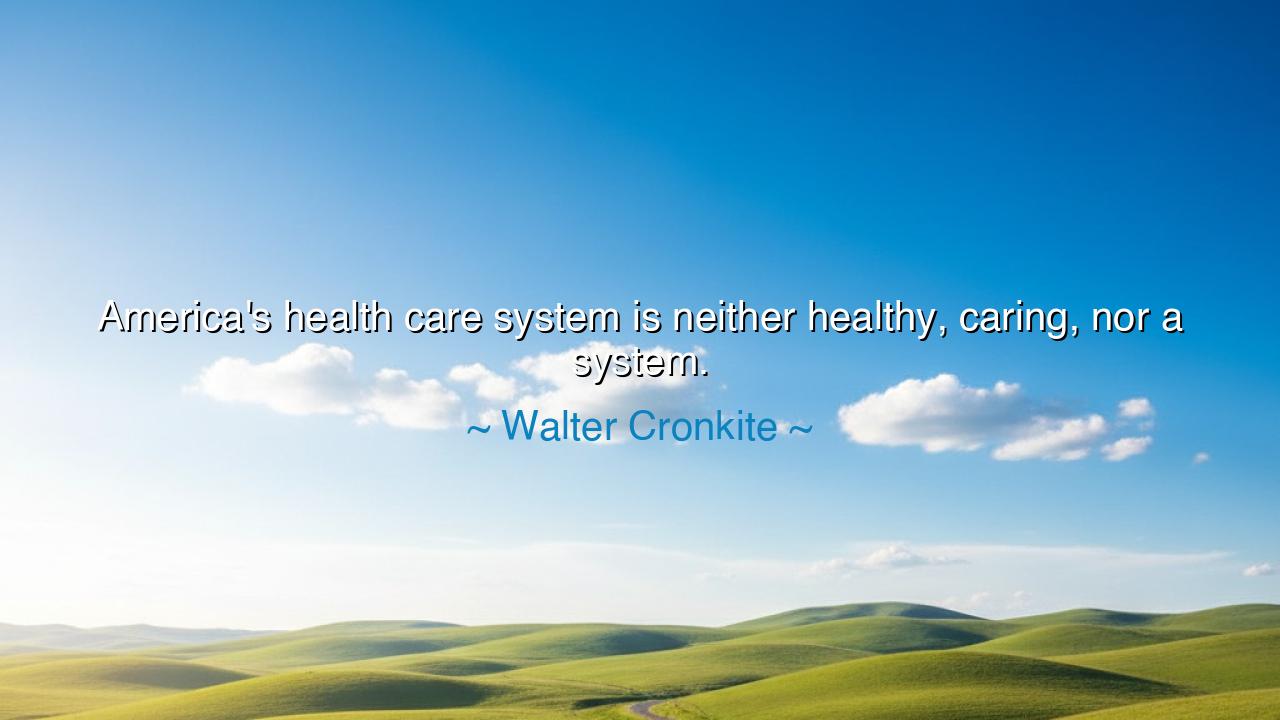
America's health care system is neither healthy, caring, nor a






“America’s health care system is neither healthy, caring, nor a system.” Thus spoke Walter Cronkite, the trusted voice of a generation, whose calm words once carried truth through the storms of history. In this declaration, he laid bare a paradox of a great nation — that in its pursuit of progress and power, it had built a structure of healing that often failed to heal, a network of care that too often forgot to care, and a system so fragmented that it could scarcely be called one. His words ring not as condemnation alone, but as lamentation — the cry of a wise elder witnessing a civilization that has gained the world yet risks losing its compassion.
Cronkite’s insight arose not from cynicism, but from clarity. He had seen wars, famine, triumph, and innovation; he had watched mankind reach the moon and stumble in its own cities. He knew that the strength of a nation lies not in its wealth or weapons, but in its humanity — in how it tends to its weak, its poor, its sick. When he spoke these words, he was not merely describing a bureaucratic failure, but a moral one. For what good is a health care system if it cannot embody the very virtues — health, care, and unity — that its name proclaims?
The ancients, were they to hear him, would nod in sorrowful agreement. For they too believed that the first duty of civilization is to care for the body and soul of its people. In Greece, the physician Hippocrates taught that medicine was not a trade but a sacred trust — that to heal was to serve both man and the divine. In Rome, the philosophers wrote that the strength of the republic depended upon the well-being of its citizens. And in the East, the sages of China built their traditions of medicine upon the harmony of life itself — not the pursuit of profit, but the preservation of balance. How far, then, has the modern world drifted from this wisdom, when the art of healing becomes the marketplace of misery?
Consider the story of Dr. Elizabeth Blackwell, the first woman to earn a medical degree in America. She entered medicine not for glory, but from compassion — because she saw suffering and wished to relieve it. In her time, hospitals were few and crude, and the poor often died without a physician’s touch. Yet she persisted, guided by conscience rather than currency. Her life reminds us of what Cronkite mourned: that once, care was an act of humanity, not a commodity. She healed not only bodies but the wounded soul of her society, proving that medicine, at its best, is the marriage of knowledge and kindness.
Cronkite’s words also echo with warning — that a society which loses its care will soon lose its health, both physical and moral. For when hospitals become places of debt rather than recovery, when doctors are chained to paperwork rather than patients, when the sick are weighed not by need but by income, the soul of medicine dies. The system becomes a machine — vast, cold, and blind to the heart. And yet, within this darkness, there remains the power of the individual — the nurse who stays past her shift to comfort the dying, the physician who treats the uninsured, the neighbor who brings soup to the bedridden. These quiet acts of care keep alive the flame that Cronkite feared might fade.
His words are not only a critique but a call — a call to restore the sacred covenant between healer and healed, between nation and citizen. For true health cannot be purchased; it must be cultivated in the soil of compassion and justice. A system that forgets this becomes an engine of division. But when the people remember their shared humanity, when care becomes the common language once more, even the most broken structure can be rebuilt into something whole.
So, dear listener, take this teaching to heart: do not wait for systems to change before you choose to care. Begin in your own circle — with your family, your neighbor, your community. Help those who suffer; speak for those unheard. Support those who heal not for wealth but for love. For if each person tends to another with sincerity, the cracks in the grand edifice will mend, and Cronkite’s lament may yet be transformed into hope.
Practical actions for the seeker: Live as though care were your creed. Give time, not only coin, to those in need. Support honest healers and institutions that place humanity before profit. Nourish your own health — in body, mind, and heart — so that you may better serve others. And remember: no nation can truly thrive until it learns again to care, to heal, and to stand together as one living system, bound not by policy but by compassion. For that is the true medicine of civilization, the cure that endures when all else fails.






AAdministratorAdministrator
Welcome, honored guests. Please leave a comment, we will respond soon